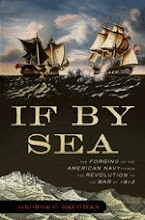AWARDS
"If By Sea" received the Samuel Eliot Morison Award from the New York Commandery of the Naval Order of the U.S. in New York City on November 3, 2008. The award is given every year to an "American author, who by his published writings shall have made a substantial contribution to the preservation of the history and traditions of the US Navy".
"If By Sea" has received an Honorable Mention for the prestigious 2009 Fraunces Tavern Museum Book Award. "The award is presented each year to the author of the best, newly published work on the American Revolutionary period, combining original scholarship, insight and good writing,......." The committee is also empowered to name additonal awards such as Honorable Mentions..... whenever they deem appropriate".
"If By Sea" has received an Honorable Mention for the prestigious 2009 Fraunces Tavern Museum Book Award. "The award is presented each year to the author of the best, newly published work on the American Revolutionary period, combining original scholarship, insight and good writing,......." The committee is also empowered to name additonal awards such as Honorable Mentions..... whenever they deem appropriate".
Best Seller Lists
#5 on the best seller list for the San Francisco Chronicle.
#8 on the best seller list for the Maine Sunday Telegram.
#8 on the best seller list for the Maine Sunday Telegram.
Review
"This is a book for those who like their history braced by serious thinking - and spiced by action. Goerge Daughan makes us realize just how complicated it was for Americans to acquire a navy - and keep one - for the first three decades of our national existence. Simultaneously he grips us with vivid narratives of what these mostly forgotten sailors accomlished."
Thomas Fleming, author of The Perils of Peace: America's Struggle to Survive after Yorktown.
Thomas Fleming, author of The Perils of Peace: America's Struggle to Survive after Yorktown.
Review
"If By Sea" illuminates the tangles and contested origins of American naval power better than any other book in recent memory. Daughan has a sharp eye for detail as well as a firm grasp of the big picture. His writing combines passionate conviction with a deep knowledge of seamanship in a way reminiscent of Samuel Eliot Morison. This is a book I will read again."
Edwin G Burrows, co-author of Gotham
Edwin G Burrows, co-author of Gotham
Review
"If By Sea by George C. Daughan covers the Navy's first forty years with authority, clarity and detail. He puts the famous names - John Paul Jones, Oliver Hazard Perry - in context, while bringing others - including dozens of Revolutionary War figures, hitherto unknown to me - to light. He shows how the military, like any other large organization, lurches and learns over time, from blunders, missed opportunities and general snafu, until those moments when the right men are at headquarters and in the field, and everything gloriously clicks."
Richard Brookhiser, author of George Washington on Leadership and What Would the Founders Do?
Richard Brookhiser, author of George Washington on Leadership and What Would the Founders Do?
More Reviews
Reviews are added below as they come in. In order not to be too repetitive many of the reviews are condensed.
Publishers Weekly
"Daughan brings a long academic career and solid command of his sources to this provocative history of the origins of the U.S. Navy. Conventional wisdom has the navy beginning in the 1790's. Daughan instead traces its roots to the Revolution. The fleet established by the Continental Congress had a relatively undistinguished career, but Daughan demonstrates that the Americans gained technical experience, produced talented officers, trained seamen and developed a basic understanding of how a navy should be employed. The question then was whether a navy would concentrate too much authority in the central government and risk embroiling the new country in foreign quarrels. By contrast, a coastal defense force of small ships threatened nobody, foreign or domestic. Daughan traces the debate through four administrations, smoothly integrating political with external influences like the Quasi-War with France (1798-1800) and the campaign against the Barbary pirates. Not until the War of 1812, when the navy proved critical did a national consensus emerge that preparing for war was the best way of avoiding one - a lesson that remains worth rememering. "


